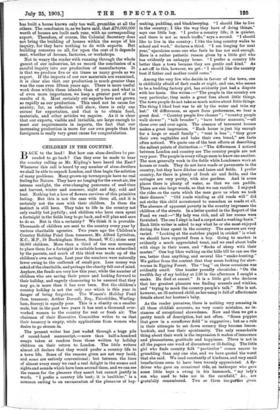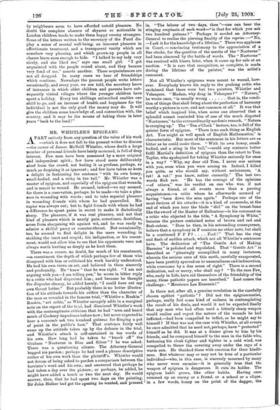CHILDREN IN THE COUNTRY.
BACK to the land ! But how can slum-dwellers be per- suaded to go back ? Can they ever be made to hear the country calling as Mr. Kipling's hero heard the East? Whenever this call is heard by any number of slum-dwellers we shall be able to unpack London, and thus begin the solution of many problems. Many grown-up townspeople have no real feeling for Nature. They have no longing for the sweet air, the intense sunlight, the ever-changing panorama of seed-time and harvest, winter and summer, night and day, cold and heat. Nothing but a love of flowers survives of this primitive feeling. But this is not the case with them all, and it is certainly not the case with their children. In them the instinct is still keen. They take to life in the country not only readily but joyfully ; and children who have once spent a fortnight in the fields long to go back, and will plan and save to do so. But is this a certainty ? We think it is provable. Thousands of children are sent to the country every year by various charitable agencies. Two years ago the Children's Country Holiday Fifnd (hon. treasurer, Mr. Alfred Lyttelton, K.C., M.P., 18 Buckingham Street, Strand, W.C.) alone sent 34,000 children. More than a third of the sum necessary to place them for a fortnight in suitable homes was subscribed by the parents, and much of this third was made up of the children's own savings. Last year the numbers were naturally fewer owing to the outbreak of small-pox. Less money was asked of the charitable, and perhaps the charity fell out of mind. Anyhow, the funds are very low this year, while the number of children who are saving their pence and looking forward to their holiday, and eagerly clamouring to be assured that they may go, is more than it has ever been. But the children's country holiday is not the only one which is this year in danger of being forgotten. The Women's Holiday Fund (hon. treasurer, Arthur Darnell, Esq., Fairchildes, Warling- ham, Surrey) is equally poor. This is a charity on a smaller scale, but in the past two years it has sent a thousand over- worked women to the country for rest or fresh air. The chairman of their Executive Committee writes to us that their treasury is empty, while applications from women who desire to go stream in.
The present writer has just waded through a huge pile of round-hand manuscript,—more than half-a-hundred essays taken at random from those written by holiday children on their return to London. The little writers almost all declare that they would prefer a country life to a town life. Some of the reasons given are not very lucid, and some are entirely conventional ; but between the lines of almost every essay we read a real delight in the scenes and sights and sounds which have been around them, and we can see the reason for the pleasure they assert but cannot justify in words. "I prefer a country life best; it is healthier," is a common ending to an enumeration of the pleasures of hay-
making, paddling, and blackberrying. " I should like to live in the country; I like the way they have of doing things," says one little boy. " I prefer a country life ; it is quieter, and there is not so much traffic," says a second. "I should like to live in the country ; I like the long country walks to school and work," declares a third. " I am longing for next year," ejaculates some one who feels be has not said enough. Here is a rather pathetic reason given by a little girl who has evidently an unhappy home. " I prefer a country life better than a town because they are gentle and kind." As a set-off to this, however, we get : I should like the country best if father and mother could come."
Among the very few who decide in favour of the town, one is childishly afraid of dark roads at night, and one, who seems to be a budding factory girl, has evidently just had a dispute with her hosts. She writes :—" The people in the country are very particular, they make a great fuss about little things. The town people do not take so much notice about little things. The thing I liked best was to sit by the water and trim my hat." Of differences, as apart from preferences, we hear a great deal. " Country people live cleaner "; " country people walk slower " ; "talk broader "; "have better tuanners,"—all these over and over again. The absence of tenement houses makes a great impression. " Each house is just big enough for a large or small family " ; " rent is less " ; " they grow their own vegitables and bake their own bread," are facts often noticed. We quote one of the best efforts at describing the salient points of distinction " The differences I noticed between London and country are The country people are not very poor. The people in every village seem to know one another. The men generally work in the fields while Londoners work at houses or roads. They do not have roads or pavements in the country, but they have ditches and lanes and fields. I prefer country, for there is plenty of fresh air and fields, and the cottages are very pretty, with nice gardens. And in some places there is plenty of water, so that we can paddle. There are also large woods, so that we can ramble. I enjoyed the rides on the carts which the men gave us when we took their dinners." " Old roads winding as old roads will " did not strike this child accustomed to macadam as roads at all. The absence of apparent poverty in the country impresses the children of the streets. In a letter quoted in the Report of the Fund we read :—" My lady was rich, and all her rooms were furnished. The one I slept in had a carpet and a washing-basin." Each little writer is asked to say what he or she most enjoyed during the time spent in the country. The answers are very varied. " Looking at the matches played in cricket" is what we should have expected from a boy. Going to market is evidently a much appreciated treat, and we read about bulls with rings in their noses, and " flocks of sheep with their master." One boy likes walking on the hills till he can see the sea, better than anything, and several like " snake-bunting." We gather from the context that they mean looking for slow- worms in Epping Forest. The " bag " on these occasions was evidently small. One hunter proudly chronicles " On the twelfth day of my holiday at 2.30 in the afternoon I caught a snake. He died at sunset." It is a little girl who declares that her greatest pleasure was finding mussels and winkles, and "trying to mock the country-people's talk." She is not, however, an ill-natured child, as her essay is full of affectionate details about her hostess's baby.
As the reader perceives, there is nothing very amusing in all these childish accounts, no very comic mistakes, no in- stances of exceptional shrewdness. Now and then we get a pretty touch of description, but not often. "Some poppies that grew in a cornflower field " is suggestive ; but as a rule in their attempts to set down scenery they become lesson• bookish, and lose their spontaneity. The only remarkable thing about their work is the impression it makes of innocence and pleasantness, gratitude and happiness. There is not in all the papers one word of discontent or ill-feeling. The little girl who finds country folk " particular " comes nearer to grumbling than any one else, and we have quoted the worst that she said. We read constantly of kindness, and very small benefactions seem to have been warmly appreciated. A fly- driver who gave an occasional ride, an innkeeper who gave some little boys a swing in his hammock, " my lady's son who used to take me in the cornfield," 8:c., are gratefully remembered. Two or three tea-parties given
by neighbours seem to have afforded untold pleasure. No doubt the complete absence of shyness so noticeable in London children tends to make them happy among strangers. Some of the letters written to the secretary of the Fund dis- play a sense of mental well-being, an innocent pleasure in affectionate treatment, and a transparent vanity which are somehow very pleasing, and which grown-up people in all classes learn soon enough to hide. "I talked to my lady very nicely, and she liked me," says one small girl. "I, got acquainted with the people round about, and they became -very fond of me," asserts another. These acquaintances are not all dropped. In many cases we hear of friendships which continue, Nowadays the poorest people write letters occasionally, and every year, we are told, the secretary hears of instances in which older children and parents have sub- sequently visited villages where the younger children have spent a holiday. Every ten shillings subscribed enables one child to go, and an increase of health and happiness for the individual is not the only good the money may do. It will give the children some knowledge of, and connection with, the country, and it may be the means of taking them in later years " back to the land !"







































 Previous page
Previous page